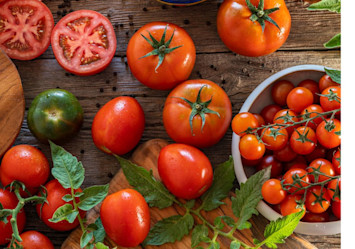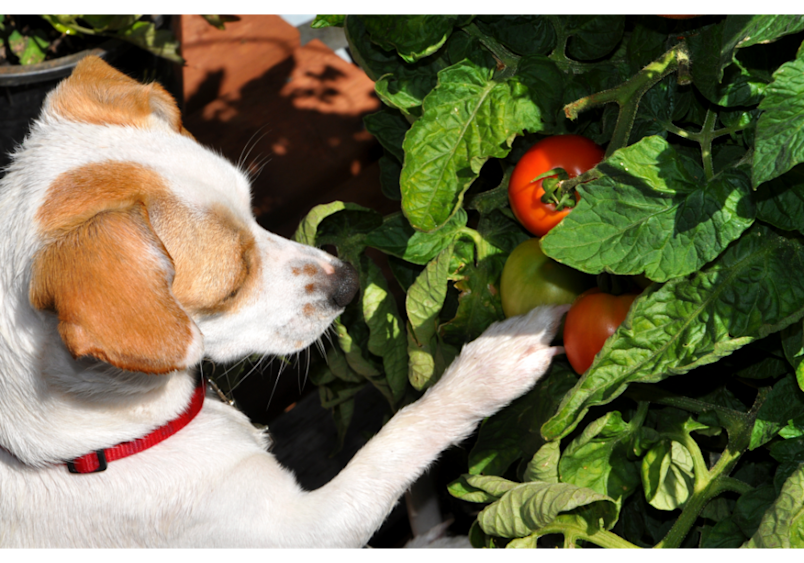
When you're preparing fresh tomatoes in the kitchen, your furry companion likely hovers nearby, eyes pleading for a bite. But can dogs eat tomatoes safely? The short answer is yes, dogs can have ripe, red tomatoes. But before you share that juicy slice, it's crucial to understand which parts are safe, which are toxic, and why that distinction can impact your dog's health.
Can Dogs Eat Tomatoes Raw?
Yes, dogs can eat tomatoes raw when they're ripe. Proper portion sizes depend on your dog's weight:
Small dogs (under 30 lbs): 1-2 small pieces
Medium dogs (30-50 lbs): 2-3 pieces
Large dogs (over 50 lbs): 3-4 pieces
This includes cherry tomatoes too – their small size makes them convenient for portion control. Just remember to cut them in half for smaller dogs to prevent choking.
Limit tomato treats to once or twice weekly. Remember, treats (including tomatoes) should make up no more than 10% of your dog's daily calories.
For puppies, wait until they're at least 6 months old before introducing tomatoes. Their developing digestive systems are more sensitive, so start with tiny amounts when you do begin.
How to Safely Feed Tomatoes to Your Dog
Want to share tomatoes with your furry friend? Here's how to ensure they're safe:
Look for deep red color with no green areas
Wash thoroughly to remove pesticides
Remove all green parts including stems and leaves
Cut into bite-sized pieces to prevent choking
Start with small amounts.
Can Dogs Eat Cooked Tomatoes?
Most cooked tomato dishes include harmful additives. If you want to share cooked tomatoes with your pup, only offer plain, cooked tomatoes with absolutely no added ingredients like garlic, onion, or seasonings.
While fresh, ripe tomatoes prepared this way can be safe, most processed tomato products are dangerous for dogs and should be avoided entirely. Tomato sauce and pasta sauce usually contain toxic garlic and onion, while ketchup is loaded with sugar and sodium. Canned tomatoes often contain excess salt, pizza sauce has multiple harmful ingredients, and sun-dried tomatoes are concentrated and often preserved with oils and salt.
If you're enjoying Italian night and those pleading eyes are hard to resist, remember that these products contain ingredients far more dangerous to dogs than tomatoes themselves. Stick to fresh, properly prepared tomatoes to keep your pup safe.
Why Are Some Tomatoes Bad for Dogs?
Green tomatoes and tomato plants contain glycoalkaloids (solanine and tomatine) that can affect your dog's nervous system, digestive system, and heart. While it would take a large quantity to cause serious poisoning in most dogs, even small amounts can cause uncomfortable symptoms, especially in smaller breeds.
The concentration of these toxins drops dramatically as tomatoes ripen. To keep your pup safe, fence off tomato plants in your garden or grow them in elevated containers out of reach.

Signs That Tomatoes Are Bad for Dogs
If your dog has gotten into green tomatoes or tomato plants, watch for these warning signs. Symptoms typically appear within a few hours of ingestion and can range from mild discomfort to more serious complications depending on the amount consumed and your dog's size.
If you discover your dog ate a green tomato, monitor them closely. One small green tomato likely won't cause severe poisoning in larger dogs, though smaller dogs are at higher risk. Watch carefully for the following symptoms:
Digestive Symptoms:
Drooling (often the first sign)
Vomiting and diarrhea
Stomach pain or hunched posture
Loss of appetite
Neurological Symptoms:
Weakness and unsteady movement
Tremors or seizures (in severe cases)
Confusion or disorientation
Other Symptoms:
Lethargy or unusual tiredness
Irregular heartbeat
If your dog shows any of these signs after eating tomatoes, contact your veterinarian immediately. Quick action can prevent complications. Even if symptoms seem mild, contact your vet if you notice any signs of distress or if your dog is small, as they're more vulnerable to toxin effects.
Protecting Your Dog from Tomato-Related Emergencies
Even with careful supervision, a sneaky snack from the garden can happen in a flash, and in that moment, knowing your next step is critical. We've all been there—the fear that your dog needs a vet visit, but struggling to balance their well-being with the potential cost.
Initial emergency visits can start with an exam fee of $100 to $250, plus the cost of diagnostic tests like blood work, which can add another $150 to $300. With treatment for toxin ingestion typically costing between $800 and $2,500, you're faced with a serious financial decision.
In a moment when every second counts, you shouldn't have to hesitate, all you should be thinking about is getting your dog the care they need. This is where pet insurance can help. Make sure you get a plan that includes a 24/7 pet helpline that offers immediate expert guidance, giving you a professional opinion right from your phone. This service can help you decide whether a trip to the emergency vet is necessary or if it's safe to simply monitor them at home.
Consider adding an optional wellness plan to help you stay proactive, as routine checkups are the perfect opportunity to talk to your vet about potential household and garden toxins. By budgeting for their regular checkups and planning for those moments you can't predict, you're protecting your pup from tomato poisoning and whatever else life throws at them.
When every minute counts, having dog insurance means saying "yes" to the best treatment without checking your bank balance first!
So, Are Tomatoes Safe for Dogs?
The answer is yes – when they're ripe and red! While dogs don’t need tomatoes in their diet, they can offer some nutritional benefits: fiber for digestion, lycopene for antioxidant support, and vitamins C and A to boost immunity, vision, and coat health. Potassium also supports muscle function, and their low-calorie content makes them a smart treat for weight-conscious pups. In fact, some commercial dog foods even include tomatoes.
Still, moderation is key. Dogs get most of their essential nutrients from balanced pet food, so think of tomatoes as a bonus—not a staple. And before introducing any human food, always consult your vet to ensure it’s right for your pet.
Whether you're sharing a slice or enjoying garden time together, smart planning and knowing which foods are safe help keep your dog healthy, happy, and protected—no matter what surprises come your way!